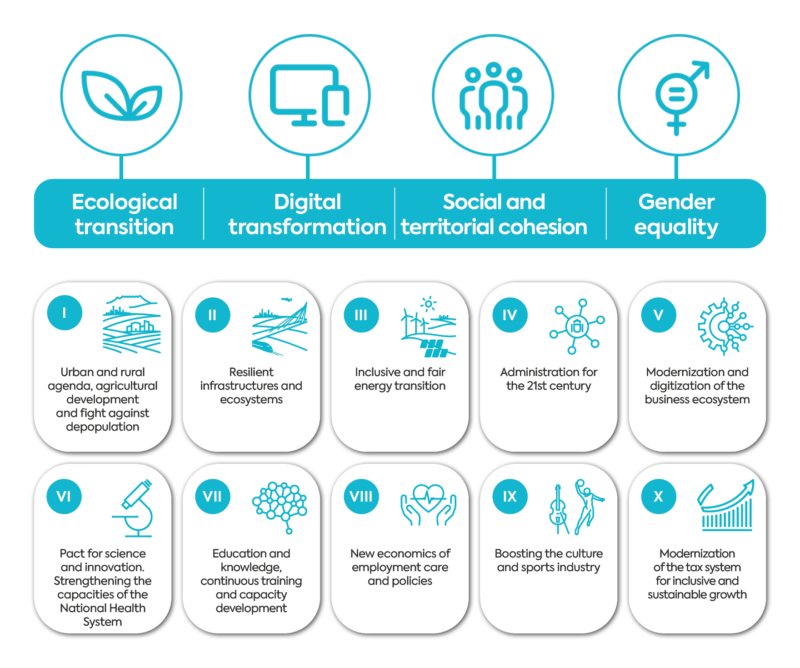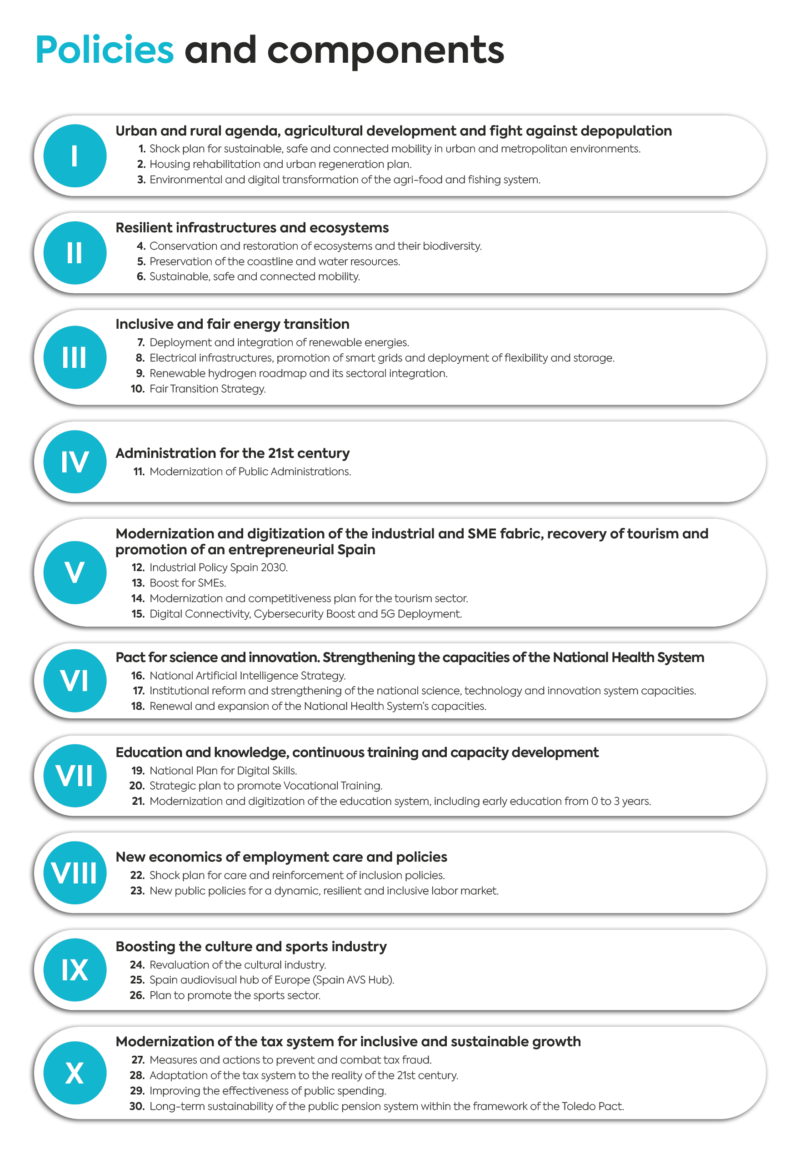Recovery Plan: The opportunity to digitize your business

The European Commission has given the green light to the implementation of the Recovery, Transformation and Resilience Plan designed by the Government of Spain, with the aim of channeling economic aid from the EU, to tackle the financial and social crisis derived from COVID -19.
These European funds, better known as Next Generation EU, constitute the largest economic stimulus package, ever financed by the EU. With a total endowment of € 806.9 billion, Spain is expected to receive € 140 billion in direct transfers and loans during the period between 2021 and 2027.
Based on this aid system, the EU intends to relaunch the economy of the different countries that make up the Eurogroup, betting on the digital transformation, sustainability and modernization of the productive fabric.
If you have a company and are interested in getting the most out of European subsidies and aid, take a look at our detailed analysis of the key points to the Recovery Plan.
The Recovery Plan in Spain
The year 2021 will be a date remembered not only for the various consequences of COVID-19, but also for the decisive commitment of the EU to repair the economic damage caused by the pandemic and boost the economies of the countries in the Eurozone, based on three objectives: digital transformation, modernization and the fight against climate change.
Specifically, Spain, like other Eurogroup countries, will receive a grant from the Next Generation EU funds destined to cover the projects contemplated in its Recovery, Transformation and Resilience Plan that was approved last June by the European Commission.
The Government of Spain has launched an official website on the Recovery, Transformation and Resilience Plan, so that companies and public institutions, such as ministries, autonomous communities and city councils, can access all the information related to public tenders, subsidies and aids linked to Next Generation EU, and to submit applications.
Recovery Plan Structure
The Recovery Plan prepared by the national Executive incorporates an important investment and reform agenda that is based on four transversal axes:
- Ecological transition
- Digital transformation
- Social and Territorial Cohesion
- Gender Equality

Regarding its configuration, the Recovery Plan is divided into 10 structural reform policies, which in turn are subdivided into a total of 30 plans or ‘components’. All of them are perfectly aligned with the Recovery and Resilience Mechanism (RRF), considered the centerpiece of the Next Generation EU funds, which has an economic endowment of 723,800 million euros.

The opportunity for digital transformation in Spain
The crisis derived from the pandemic has served as a stimulus to accelerate the digitization process of Spanish companies and institutions, highlighting their strengths, but also their weaknesses, from an economic, social and territorial point of view.
For this reason, the commitment to digital transformation is more urgent than ever to address issues related to improvements in process efficiency and customer experience, new business opportunities and collaborative work, business resilience and the promotion of an innovative culture.
Thus, the Spanish Government has chosen to promote digital transformation in each of the 30 ‘components’ of the Recovery Plan, with a total investment that reaches 28.2%, compared to 20% set by the EU. Each of these ‘components’, in which the 10 policies are subdivided, are characterized by belonging to very disparate economic sectors, such as agriculture, tourism, industry, mobility, among others; and, also, for including other areas such as education, social security and finance.
Main investments of the Recovery Plan for the digital transformation of SMEs
Component 13 in Policy V is dedicated exclusively to promoting SMEs. Said ‘Component’ foresees investments of 4,894 million euros, in five strategic areas: entrepreneurship, growth, digitization and innovation, support for trade and internationalization.
Regarding the field of digitization and innovation of Spanish SMEs, the plan contemplates the execution of the following programs:
1. R&D Projects in Artificial Intelligence and other Digital Technologies
Financial support to all those industrial research and experimental development projects, focused on obtaining knowledge and technologies that provide solutions to problems posed by today’s society, incorporating R+D.
2. Agro-Industry Boost
Financing of technology-based business projects that stimulate the digital transformation of SMEs in the agri-food sector and rural areas.
3. Digital Entrepreneurs
All those female digital entrepreneurship projects that make it possible to reduce the gender gap in the digitization and innovation sector, will also have financial support from the Recovery Plan.
4. Next-Tech Background
The Next-Tech Fund has been created to promote the development of digital projects, invest in scale-ups and make Spain an attractive country for foreign and innovative companies in the field of digitization.
5. Digital Toolkit
This program has an endowment of 3,000 million euros, in concept of non-refundable aid, and its objective is to promote the digitization of companies, through tools related to digital marketing, electronic commerce and digital administration.
6. Cybersecurity
This program concentrates all those reforms and investments in terms of digital connectivity and 5G that will be undertaken in Spain, over the next few years.
7. Digitalization of Commerce
This program is aimed at facilitating the digitization and internationalization of retail trade and commercial distributors, based on two different lines of aid. One aimed at achieving more sustainable markets and the other seeking modernization.
8. Digitalization of Tourism Companies
The comprehensive modernization of the Spanish tourism sector is the main objective of this program. For this, aspects such as the sustainability of tourism destinations and products, the digitization of companies, the design of tourism resilience plans for extra-peninsular territories and special actions in the field of competitiveness will be considered.
9. Digitalization of the Audiovisual Sector
The aim is to position Spain as a benchmark in the audiovisual production of videogames and e-Sports, by promoting innovation and improving the regulatory framework that regulates digital and videogame creation.
10. Group Bonds for SMEs
The purpose of the Community Bonds is to improve the connectivity of SMEs, especially in those cases in which the quality of the internet connection is poor to start or continue with a digitization project.
11. R&D Missions in Artificial Intelligence 2021
This program seeks to give financial support to all those large industrial research or experimental development projects that use Artificial Intelligence (AI) and are related to any of the following strategic sectors: agriculture, health, environment, energy and employment.
Accelerate SMEs: added value for the digitization of SMEs
Within the aid framework aimed at achieving digital transformation of SMEs and the self-employed, the Government of Spain, through the Ministry of Economic Affairs and Digital Transformation and the public entity Red.es, has launched the Accelerate SME program. An additional program whose mission is to provide advice and training to SMEs, to accelerate their digitization process, in addition to serving as financial support in their digital transformation process and implementation of remote work. The package of measures around which the Accelerate SMA program is configured include:
-
Expansion of the number of offices that are part of the Digital Transformation Offices program and improvement of the portfolio of advisory services for SMEs.
-
Accelerate SME – Talent training program.
-
Support for the creation of technological solutions that favor the digitization of SMEs.
-
Financial support for the purchase and leasing of equipment and services that favor digitization and remote work.
PERTE: Strategic Projects for Recovery and Economic Transformation
Along with all these programs, aimed at achieving digital transformation of SMEs, the Government has created another additional instrument named the Strategic Projects for Recovery and Economic Transformation, or PERTE by its Spanish acronym.
This new tool for public-private collaboration, between administrations, companies and research centers, has the ultimate goal of enabling business scalability, improving employment and economy competitiveness.
The Council of Ministers is the body in charge of determining which project or group of projects, among all those presented, are declared as PERTE. To do this, a series of requirements will be considered that will be assessed by the body in question, such as:
-
Contribute to economic development, job creation and increased competitiveness.
-
Favor the integration and growth of SMEs.
-
Promote compliance with one of the objectives established in the Recovery, Transformation and Resilience Plan.
-
Quantitative or qualitative relevance, both at the level of the size or scope of the project; or if it represents an important technological or financial risk.
-
Combination of knowledge, experience, financial resources and economic actors.
The first PERTE approved by the Council of Ministers is linked to the development and manufacture of electric and connected vehicles. The rest will be approved throughout the period of execution of the Recovery, Transformation and Resilience Plan, within the framework of Next Generation EU grants.
1. PERTE Electric and Connected Vehicle
Approved on July 13, 2021, it seeks to strengthen the production chains of the automotive industry in Spain, favoring the manufacture of electric vehicles. All this, aimed at making Spain become a European Hub for electromobility.
2. PERTE Aerospace
This PERTE aims to improve the technological and industrial capabilities of the aerospace sector and enhance the strategic positioning of Spanish companies, in the space and aeronautical sectors.
3. PERTE of Smart and Sustainable Agri-Food Chains
Agri-food is another of the leading sectors in the PERTE. In this case, it is about promoting the digitization of all the productive processes of the agri-food chain, in order to satisfy the growing demand for healthier and more sustainable foods.
4. PERTE of Personalized Medicine
The ultimate aim is to introduce a whole series of improvements related to diagnostic, therapeutic and preventive innovation in the National Health System that result in an increase in the quality of care and support the generation of industrial fabric linked to this sector.
All these programs shape the Recovery, Transformation and Resilience Plan, approved by the European Commission, with the aim of redirecting the Spanish economy to the path of growth, opting for a more economic sustainable, egalitarian and cohesive model.



